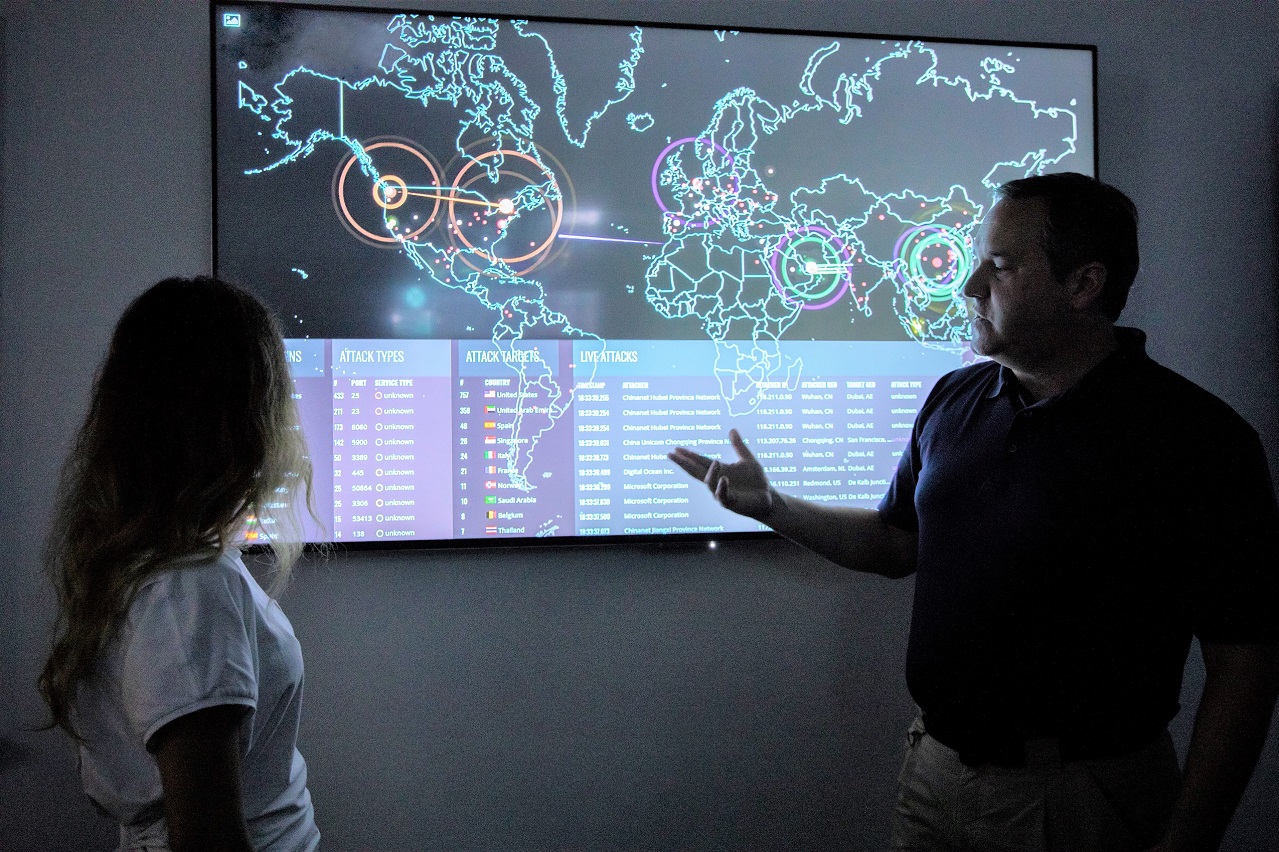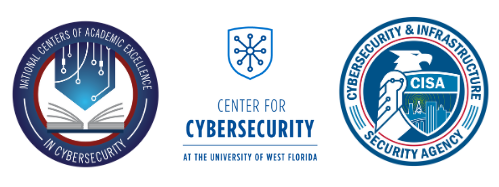National Cybersecurity Workforce Development Program

The University of West Florida leads the National Cybersecurity Workforce Development Program, CyberSkills2WorkTM, a nationally scalable and sustainable cybersecurity workforce program to rapidly expand the number of qualified cybersecurity professionals. The program is funded by grants from the National Centers of Academic Excellence in Cybersecurity (NCAE-C) Program ($2.5 million) at the National Security Agency and the Cybersecurity and Infrastructure Security Agency (CISA) ($1.5 million). The training is provided by a coalition of 10 institutions designated by the NSA as National Centers of Academic Excellence in Cybersecurity (CAE-C).
The CyberSkills2WorkTM program focuses on recruiting, preparing, and placing transitioning military, first responders, veterans, military spouses, women, underrepresented employees, and government employees into cybersecurity work roles in our nation’s Critical Infrastructure Sectors, including defense industrial base, energy, and financial services.
The program prepares participants for 14 entry-level through advanced cybersecurity work roles that align with the NICE Cybersecurity Workforce Framework. The program offers flexible training pathways, offered online, in-person or hybrid, by a coalition of 10 CAE-C designated institutions. Each pathway provides training courses, industry certifications, and digital credentials.
Additional information is available at CyberSkills2Work.org.
UWF CyberSkills2Work Training Program Information
In 2024, UWF will offer two training pathways to prepare participants for System Administrator and Cyber Defense Analyst work roles. The program will provide asynchronous online training courses, industry certification preparation, and vouchers, digital badges and credentials, professional development, job placement support.
Each pathway will be offered for a cohort of 30 eligible participants. All costs for eligible and accepted participants will be covered by the NSA grant.
System Administrator Pathway
This seven-month, five-course training pathway prepares participants for entry-level System Administrator and is a great opportunity for those with no/minimal prior IT/cybersecurity experience who want to launch a career in cybersecurity.
Cyber Defense Analyst Pathway
This seven-month, six-course training pathway prepares participants for Cyber Defense Analyst work roles and is a great opportunity for those with some IT or cybersecurity experience to expand their knowledge and skills, and advance their careers in cybersecurity.
Cyber Defense Infrastructure Support Specialist Pathway
This four-month, four-course training pathway prepares participants for Cyber Defense Infrastructure Support Specialist work roles as described in the NICE Cybersecurity Workforce Framework. This program is a great opportunity for those with at least two years of IT or cybersecurity experience to expand their knowledge and skills, and advance their career in cybersecurity. The program includes an industry certification prep course and vouchers for CompTIA Cloud+.
Visit the UWF CyberSkills2Work Program page to learn more and to apply!
Employers Interested in Hiring Program Graduates
Employers can connect with 3300+ CyberSkills2Work learners and alumni across the nation! Learners and alumni can post their resumes and highlight their clearances and certifications to employers.
Joining the CyberSkills2WorkTM National Employers Network provides organizations with first access to those who have recently completed CyberSkills2WorkTM training, earned industry certifications, and have related experience or clearance. Joining is FREE! Simply complete the brief application form and we will get back to you.
Join today! Visit https://cyberskills2work.org/i/employers.
CAE-C Institutions Interested in Joining the Program
If you are a CAE-C designated institution that offers a cybersecurity workforce program or is developing one and are interested in joining the National Cybersecurity Workforce Development Program, please complete the interest form.
Organizations and Individuals Interested in Supporting the Program
If you or your organization are interested in supporting the National Cybersecurity Workforce Development Program, please complete the interest form. We welcome individuals and organizations interested in providing support to expand program support for underrepresented and underserved populations, including transitioning military and first responders, veterans, women, and minorities. We also welcome those interested in promoting and marketing the program.
CAE-C Coalition Team
University of West Florida (Lead Institution)
Eastern New Mexico University - Ruidoso
Florida International University
University of South Florida – Cyber Florida
University of Texas at San Antonio
Contact Us
For additional information or questions, please contact Francine Coller at fcoller@uwf.edu.
Resources
- Cyber Career Pathways Tool
- NICE Cybersecurity Workforce Framework
- Cybersecurity Workforce Development Resources
- Critical Infrastructure Sectors
- CyberSeek
- CAE-C Community
This program is part of the National Cybersecurity Workforce Development Program, CyberSkills2WorkTM, and funded by the National Security Agency National Centers of Academic Excellence in Cybersecurity (NCAE-C) Program and the Cybersecurity and Infrastructure Security Agency (CISA).








